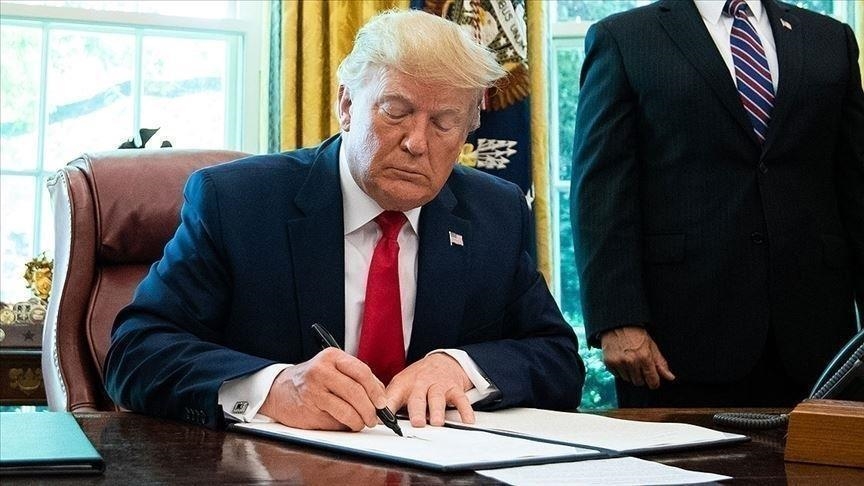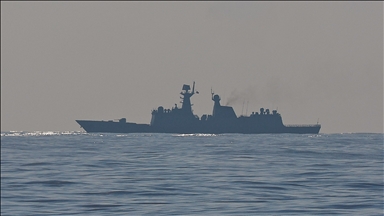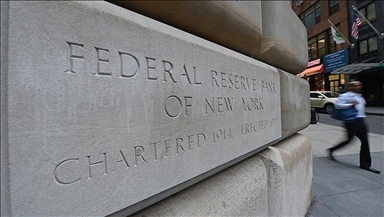
- Thailand, Cambodia and Bangladesh welcome new levies as their rates were significantly reduced from April 2 levels
ISTANBUL
US President Donald Trump signed an executive order on late Thursday that modified tariff rates on imports from dozens of nations, a broad action that has rekindled tensions in global trade.
With immediate geopolitical and economic ramifications, the new trade framework, which the White House has hailed as a move toward "reciprocity and fairness," applies tariffs ranging from 10% to 41%.
A separate order signed by Trump will increase the tariff rate on Canada from 25% to 35% on Aug. 1.
Most nations received tariff rates between 15%-30%, but Iraq (35%), Laos (40%), Myanmar (40%), Switzerland (39%) and Syria (41%) were each tagged with higher rates.
The US president earlier said that his administration had struck a "couple" of deals but did not offer further details. It is unclear which nations Trump was referring to when he spoke to reporters at the White House.
The US has struck trade deals with the UK, Vietnam, Indonesia, the Philippines, Japan, the EU, and South Korea. Trade talks with China are still ongoing.
Depending on where they were on the tariff scale, foreign leaders and trading partners from Canada to India, Switzerland to South Korea, have responded with a range of emotions, including strategic recalibration, calm relief, and irritation.
While some countries received a higher rate than what was introduced on April 2, some countries' rates were lowered.
China
Although the trade talks between the top two economies are ongoing and China's tariffs were suspended again, China on Friday said that trade protectionism “hurts all,” hours after the US implemented unilateral tariffs on many nations.
“Tariffs, trade wars have no winners and protectionism hurts all parties,” Foreign Ministry spokesman Guo Jiakun told reporters in Beijing.
Canada
Canadian Prime Minister Mark Carney said Friday that the government is "disappointed" with US President Donald Trump's decision to raise Canada's tariff rate to 35% from 25%.
He noted that while the Canadian government is "disappointed" by this decision, it will remain committed to CUSMA, the world's second-largest free trade agreement in terms of trade volume.
Carney explained that the US defended its decision by citing the cross-border flow of the opioid analgesic fentanyl, which is abused as a drug.
He emphasized that his country accounts for only 1% of the flow of fentanyl to the US and that they are working diligently to reduce this amount further.
Switzerland
As its tariff rate was raised to 39% from the initial 31% on April 2, Switzerland voiced deep regret over the US decision to impose unilateral additional tariffs on Swiss imports, despite what it described as constructive bilateral talks in recent months.
In a post on X, the Swiss Federal Council said the modified tariff rates announced by the US president "differ significantly" from the previously agreed draft joint statement, which the Federal Council approved on July 4 following months of negotiations.
New Zealand
New Zealand criticized the US move, calling the 15% tariff imposed on its exports “unwarranted.” Trade Minister Todd McClay said his country was being unfairly penalized for a relatively small trade deficit.
"It appears it has been done based upon countries that have a trade deficit with the US, which sell them more than they buy. In New Zealand's case, that's about half a billion US dollars, and in a scheme the size of the US economy, it's really not significant or meaningful," RNZ quoted McClay as saying.
Taiwan
While Taiwan's initial tariff rate was lowered to 20% from 34%, Taiwan's leader called the US new 20% tariffs on Taiwanese goods "provisional," adding that talks with Washington towards lowering the rate are continuing.
Lai Ching-te expressed hope that the 20% tariff could be lowered further once a final agreement is reached.
Thailand
Thailand welcomed the tariff reduction to 19% from a previously proposed 36%. Deputy Prime Minister and Finance Minister Pichai Chunhavajira said the new rate reflects the strong US-Thailand partnership and will enhance investor confidence and economic growth.
Cambodia
Cambodia also welcomed 19% tariffs as the Southeast Asian nation also revealed it had bought 10 Boeing aircraft from the US. The country was subjected to a 49% tariff on April 2.
Bangladesh
Bangladesh secured a reduced 20% US tariff on its exports, down from a proposed 35%, after a third round of negotiations.
“Today, we successfully avoided a potential 35% reciprocal tariff. That’s good news for our apparel sector and the millions who depend on it," Bangladesh security adviser Khalilur Rahman, who led the tariff negotiations, said in a statement.
Last month, Bangladesh placed an order for 25 Boeing aircraft in a move aimed at reducing a 35% tariff on Bangladeshi goods imposed by the Trump administration.
Anadolu Agency website contains only a portion of the news stories offered to subscribers in the AA News Broadcasting System (HAS), and in summarized form. Please contact us for subscription options.







